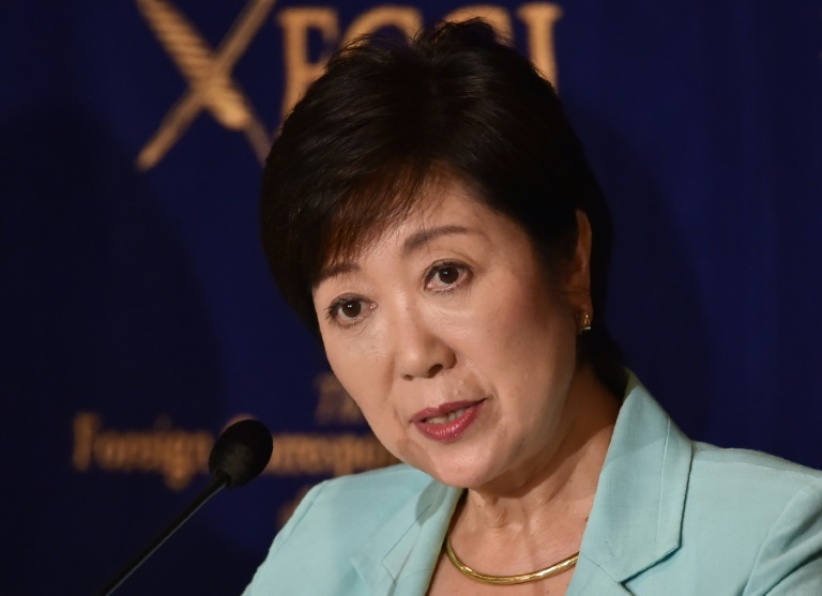 Veteran politician Yuriko Koike was elected Sunday as Tokyo’s first woman governor, according to media exit polls, and immediately vowed to get a grip on the megacity’s troubled 2020 Olympic preparations.
Veteran politician Yuriko Koike was elected Sunday as Tokyo’s first woman governor, according to media exit polls, and immediately vowed to get a grip on the megacity’s troubled 2020 Olympic preparations.
Public broadcaster NHK, Jiji Press and other major media forecast the 64-year-old Koike as the winner just after polls closed at 8 pm (1100 GMT).
Koike is a former TV anchorwoman, defence minister and environment minister.
Official ballot counting in the sprawling metropolis of 13.6 million people, was expected to take hours to complete. But with three percent of votes tallied she had more than 84,000 votes to slightly over 60,000 for her closest challenger.
Koike claimed victory and addressed supporters shortly after the media declared her the winner.
“I will lead Tokyo politics in an unprecedented manner, a Tokyo you have never seen,” she said in a voice made mildly hoarse after two weeks of campaigning.
The election, contested by a record field of 21 candidates, was called after previous governor Yoichi Masuzoe resigned over a financial scandal involving the lavish use of public funds on hotels and spa trips — the second successive Tokyo leader to quit.
Koike largely played down her achievement of becoming the capital’s first woman governor in a male-dominated society but said she will push female-friendly policies “so that both women and men can shine in Tokyo”.
A key task will be smoothing the city’s troubled road to the 2020 Olympics, hit by a series of embarrassing scandals and soaring costs.
Koike’s four-year term will extend until just after the summer Games start and her performance in the run-up will be closely watched.
A key challenge will be getting a grip on swelling costs, seen as possibly double or triple the reported original forecast of 730 billion yen ($7.14 billion).
She vowed to tackle the cost issue head on.
“I would like to review the basis for the budget, so that I can clarify for the eyes of Tokyo residents how much they would have to pay,” Koike said, adding that transparency would be the watchword.
“Reviewing the Olympic and Paralympic budget will be the litmus test for it.”
– Kadhafi, Arafat –
Euphoria in 2013 at securing the right to host sport‘s marquee event has given way to frustration over gaffes, scandals and cost overruns.
Last year Prime Minister Shinzo Abe had to tear up blueprints for a new Olympic stadium because of ballooning costs, while organisers ditched the official logo after the designer was accused of plagiarism. A new one was solicited.
Such fiascoes, however, have since been overshadowed by allegations of corruption, and French prosecutors have launched an investigation into alleged bribes linked to Tokyo’s bid. Organisers have denied wrongdoing.
Masuzoe’s predecessor Naoki Inose — who had led the successful bid to win the Games — bowed out after becoming embroiled in a personal financial scandal.
Despite the high number of candidates, the Tokyo race was seen as a three-way contest between Koike and two men — former prefectural governor Hiroya Masuda and prominent television journalist Shuntaro Torigoe.
Koike, long a fixture in Japanese media and politics, speaks fluent English and Arabic.
She graduated from Cairo University in 1976 in sociology and worked as an Arabic interpreter before going into journalism.
In 1978, she interviewed then-Libyan leader Moamer Kadhafi and Palestine Liberation Organisation chairman Yasser Arafat for a Japanese broadcaster.
She has compared herself to Hillary Clinton and was once seen as having the best chance to be Japan’s first female prime minister. But she was defeated when running in 2008 for leadership of the LDP.
“Hillary used the phrase ‘glass ceiling’. It’s often a sheet of steel in Japan,” Koike once told a television talk show.
She won the Tokyo election despite failing to obtain the party’s backing. It spurned her for failing to seek its approval before announcing her candidacy and supported rival Masuda instead.
Other key issues in the balloting were Tokyo’s dire childcare shortage and overseeing disaster response plans and preparations due to perennial earthquake threats to the capital. – Agence France-Presse































